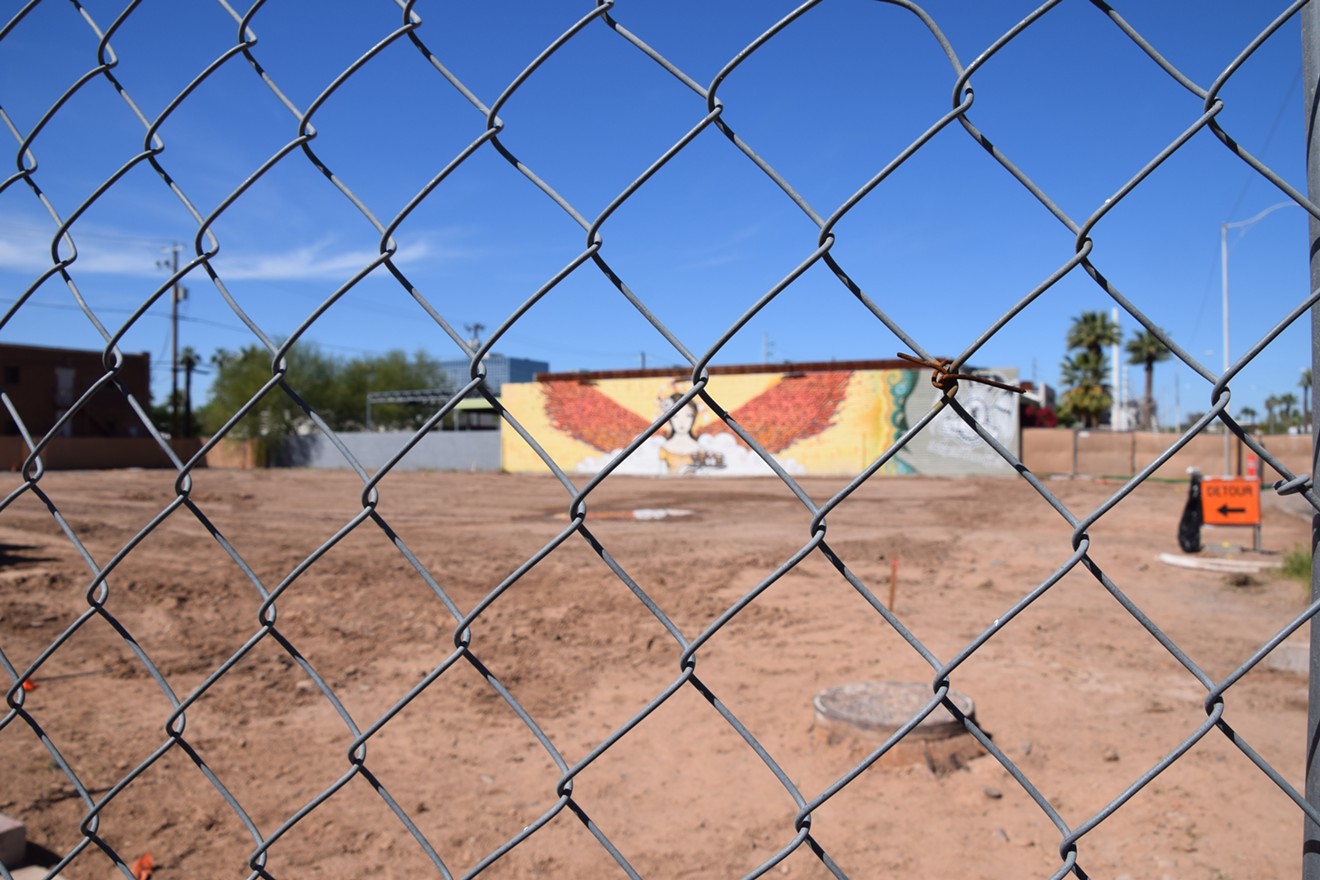Some Roosevelt Row property owners think the City of Phoenix is playing favorites.
That's the heart of a recent lawsuit brought against Phoenix. Basically, the property owners' concerns are twofold: A new downtown Phoenix development called The Derby is getting a special tax break. And that break could stick these business owners with a higher tax bill. So, they’re taking the issue to court.
The Derby is being built by Denver-based Ascentris and Transwestern Development Company on two empty lots on the northwest corner of Second and McKinley streets, across the street from FilmBar and Cobra Arcade Bar. The micro-housing high-rise is set to have 19 stories, including several levels of parking, plus ground-floor retail space, says Christine Mackay, director of community and economic development for the City.
Clearly, not everyone is happy about it – including the Goldwater Institute, a conservative public policy think tank with a libertarian bent.
On March 1, the Institute filed a lawsuit against the City of Phoenix on behalf of two Roosevelt Row business owners, Mat Englehorn and Bramley Paulin. Englehorn and his wife, Sharry, own Angel’s Trumpet Ale House, which is located right next to The Derby site. Bramley is a commercial real estate developer, who owns property in Roosevelt Row.
The lawsuit was a year in the making.
It’s rooted in a March 2016 decision by the Phoenix City Council that granted The Derby’s developers something called a Government Property Lease Excise Tax (or GPLET, for short). The City uses GPLETs, which temporarily reduce developer tax burdens, to incentivize developments that meet its long-term vision for downtown, Mackay says.
Around since 1996, GPLETs have helped several projects in downtown Phoenix, says Eric Jay Toll, communications manager for Mackay's department. Right now, the City has 11 active GPLET projects downtown — including Roosevelt Square, Skyline Lofts, Roosevelt Point, Union at Roosevelt, and The Derby in Roosevelt Row.
Here’s how they work:
When the City grants a GPLET, it takes the title of the affected property, then leases it back to the developer for several years, including the initial development period. The developer avoids paying property taxes early on, which reduces their costs. But the City benefits in the long run, when the GPLET expires and the City starts collecting higher property taxes, Mackay says.
And there's another benefit for the City, she says. Phoenix uses GPLET lease money to fund economic development projects, including landscaping, way-finding signage, historic preservation, and property maintenance, among other things.
But the Goldwater Institute doesn’t see it that way.
Its lawsuit alleges that GPLETs are unconstitutional, calling them gifts to private entities that create unequal property tax rates. The lawsuit asks the Superior Court of Arizona to stop The Derby GPLET agreement with the City, and declare the City’s GPLET ordinance unconstitutional and/or illegal.
Even the Arizona legislature is looking at the GPLET issue.
House Bill 2213, which is currently moving through the legislature, would place significant restrictions on how and where GPLETs could be used in Arizona.
Disputing The Derby GPLET is just the latest action for Englehorn and Bramley, who have a history of questioning government tax policies.
Back in January 2016, they challenged the City’s decision to authorize the Roosevelt Business Improvement District (or BID, for short). The BID, organized by community members during a two-year period, was designed to enhance the Roosevelt Row art district using a special tax on most area property owners. The tax would pay for services above and beyond those provided by the City – such as beautification and security.
Vocal critics, including Engelhorn and Bramley, took their case to the Arizona State Legislature, which passed a bill changing how BIDs are formed in Arizona. And here’s the tricky part: That bill, signed into law by Governor Doug Ducey in March of 2016, was retroactive. That means the BID can’t go forward — unless organizers resume their efforts under the new requirements.
In that case, the City of Phoenix ended up suing the State of Arizona, hoping to overturn the law, or at least the retroactivity clause. That case is still pending.
More often, it’s the GPLET issue that draws criticism.
In April 2016, developers hoping for a GPLET to develop high-rise apartments called The Stewart at the site of the former Circles building were thwarted. In that case, it didn’t help that the developer, The Empire Group, started demolition of the existing building while GPLET discussions were underway.
And now, all eyes are on The Derby.
The City of Phoenix won’t comment on active litigation, spokesperson Monica Hernandez told New Times by phone on Friday, March 10.
But Mackay was happy to share her thoughts on why GPLETs are important.
“When we look at these projects, it’s so we can have the urban downtown we want in the future now, instead of having developers build something that will be demolished in 20 years,” Mackay says. “The City has to be very visionary to get the right property developed.”
But Englehorn isn’t buying it.
“Is it even necessary?” he says of granting GPLETs in Roosevelt Row. “Other developers are building without it.”
Colorado-based Baron Properties recently built two high-rise apartment complexes near the intersection of Roosevelt and Third streets. And a new adaptive reuse mixed-use development called The Blocks of Roosevelt Row is in the works. Other relatively new developments in Roosevelt Row include Proxy 333 and the Found:RE boutique hotel.
Citing rampant development in Roosevelt Row, Engelhorn questions another aspect of the City’s GPLET policy. Sometimes, GPLETs are granted in part because the City says an area has “slum and blight.” That’s one reason The Derby GPLET was granted.
But Engelhorn disputes the City suggesting that Roosevelt Row is blighted. “Try telling all the local restaurants and businesses they’re blighted,” he says.
Turns out, the blight issue is more complicated than it appears.
Despite all the new development, Roosevelt Row does have some rundown properties, Mackay says. And it has old underground infrastructure that makes development more costly.
Englehorn thinks the blight issue is just an excuse the City uses to show favoritism to some property owners over others.
“My family's had property here for a long time,” he says. “And they didn’t get a tax break.”
He’s got other beefs as well, including worries that construction noise will drive away patrons. “Sixty percent of my business is on the patio, so cranes are a problem.”
What will become of The Derby lawsuit remains to be seen.
The City of Phoenix has until March 28 to file its response, says Jim Manley, senior attorney with Goldwater Institute. In the meantime, construction continues. And Englehorn keeps serving up the burgers and beer.
[
{
"name": "Air - MediumRectangle - Inline Content - Mobile Display Size",
"component": "18478561",
"insertPoint": "2",
"requiredCountToDisplay": "2"
},{
"name": "Editor Picks",
"component": "16759093",
"insertPoint": "4",
"requiredCountToDisplay": "1"
},{
"name": "Inline Links",
"component": "17980324",
"insertPoint": "8th",
"startingPoint": 8,
"requiredCountToDisplay": "7",
"maxInsertions": 25
},{
"name": "Air - MediumRectangle - Combo - Inline Content",
"component": "16759092",
"insertPoint": "8th",
"startingPoint": 8,
"requiredCountToDisplay": "7",
"maxInsertions": 25
},{
"name": "Inline Links",
"component": "17980324",
"insertPoint": "8th",
"startingPoint": 12,
"requiredCountToDisplay": "11",
"maxInsertions": 24
},{
"name": "Air - Leaderboard Tower - Combo - Inline Content",
"component": "16759094",
"insertPoint": "8th",
"startingPoint": 12,
"requiredCountToDisplay": "11",
"maxInsertions": 24
}
]

















